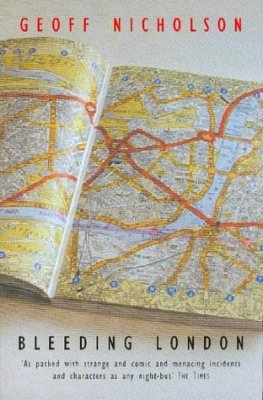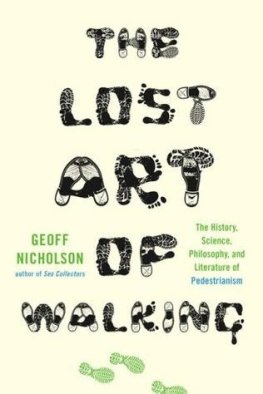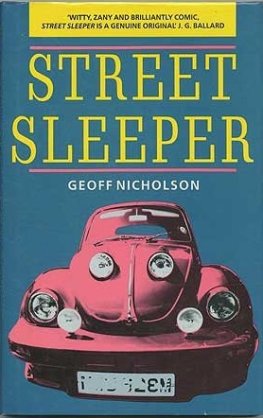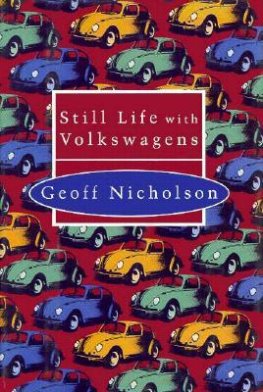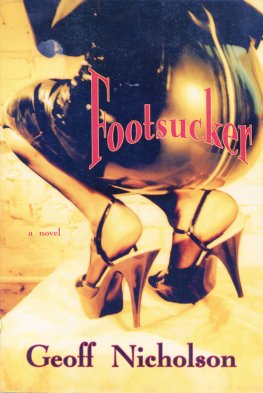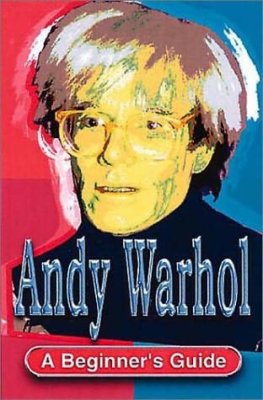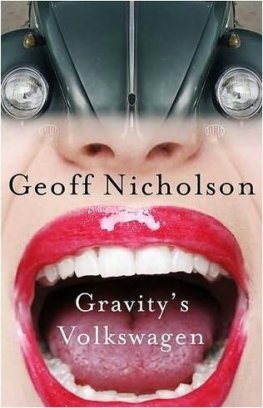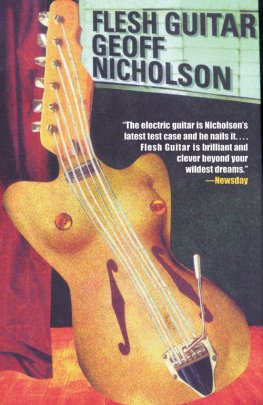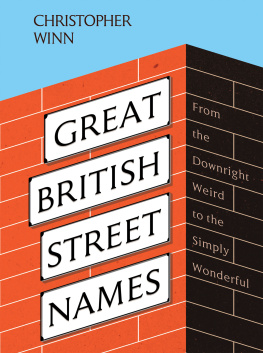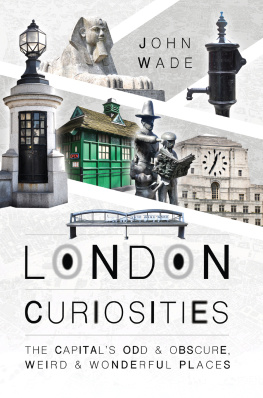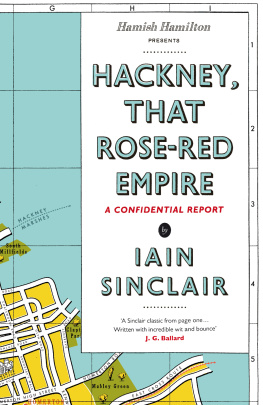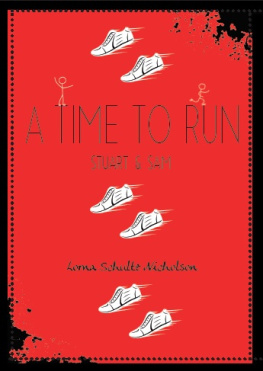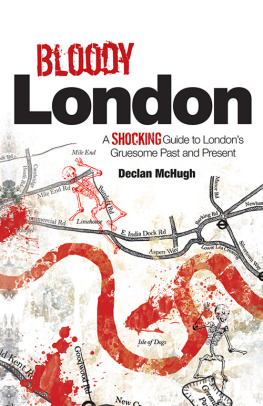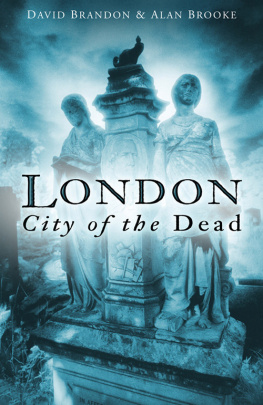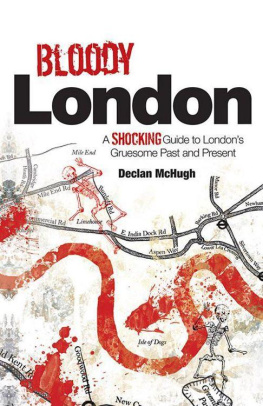Geoff Nicholson
Bleeding London
It is shortly after midday on one of those slate-grey, mid-January days when it seems never to become fully light, when dusk starts to coalesce in mid-afternoon. The cold, sheer air is pierced with panels of artificial light, and a forty-year-old man in a cashmere overcoat walks beneath a railway bridge in this frayed, nondescript part of east London. Water runs down from the girders overhead. He sees the yard belonging to a car dismantler, some of its stock parked in the road. He sees an off-licence with bars on the windows, a minicab office as narrow as a corridor. It is all alien territory and yet he is not in any ordinary sense lost. He looks pleased with himself, as though he has something to celebrate, as though he might already have been drinking; but above all else he looks out of place. The wrong man on the wrong street at the wrong time; a confluence of errors, of bad luck and hard lines.
Suddenly someone speaks to him. At first hes too self-absorbed to take any notice but then he sees that the speaker is one of six boys, men, who are walking along in the same direction as him: three black, three white, three beside him, three hanging back. He sees that theyre younger than he thought, very big, dressed in slick clothes that are encoded with American names, references to basketball and gridiron teams, and a voice repeats, I said I think youre lost.
No, the man says firmly and advances his pace, enough to show determination but not, he hopes, panic.
Yeah, I really think youre lost.
Two boys behind him each grab an arm, restraining and immobilizing him, and the one who spoke, a black kid with a big, broad, intelligent face, wiry adolescent fluff on his top lip, starts going through his pockets. The man in cashmere looks unusually philosophical, as if he has no objections to being mugged, as though he has been expecting this, as though it is what hes been waiting for. He stands still, doesnt struggle, lets them get on with it, whatever it is they have in mind. He doesnt even bother to look at his assailants. Instead his eyes stare off into the distance. The street appears utterly, improbably empty, not that he believes the presence of other people would help him.
And then he realizes he is wrong. The street isnt empty at all. He sees someone else, someone standing in the shadow of the railway bridge, just another mugger, he thinks at first, a lookout maybe. But as strange hands invade his clothes and body, removing objects keys, a handkerchief, a London A Z and throwing aside those things that are judged valueless, this new character steps forward. He looks bad, as though he has been in the wars, in a serious fight that he did not necessarily win.
He is a white man, maybe twenty-five years old, tall, broad, tough-looking. But his face is roughed up, the integrity of the skin broken through, made ragged and livid; a cut lip, an eye bruised black, raw grazes on all the faces hard, sharp, vulnerable edges. Hes wearing a petrol-blue suit that once must have looked immaculately sharp. Now its flayed out of shape, torn at the knees, streaked and clotted with ominous substances. And under the suit theres a white T shirt stained with dark islands and archipelagos of what can only be blood.
The bloody man is watching the mugging with a weary interest, walking towards it, involved yet bored by the spectacle. The black kid now has a wallet in his hands and is examining its contents with a quick, dismissive precision.
The bloody man says loudly in a northern accent, Give him his wallet back, theres a good kid.
The six muggers hear and laugh. Partly its the accent, partly its the absurdity of the request. They turn, let go of their victim having winkled out his valuables. Thats over. Theyre on to a new, more compelling engagement.
Say that again, says the boy with the wallet.
I said give him his wallet back, theres a good darkie.
The silence seems bottomless.
Then one of the white guys says, Are you insulting my friend, you racist cunt?
I dont think hes much of a friend.
By this time theyve taken in the appearance of the new arrival, read at least some of its meaning: the suit, the face, the blood. One of them, more observant or less brave than the rest, sensing something dangerous and feral, says to the others, We dont have to get involved with this, you know.
But the holder of the wallet isnt listening and says, Why dont you make me give it back?
The man runs his hand through his hair, pulls a face that conveys mostly ennui.
Im really so tired of all this, the man says, referring to a history they cannot know. All this macho, violent nonsense. I dont need it. Neither do you.
Then, as if absent-mindedly, he pulls a gun out of his pocket. It could be real, it could be a replica, but the young muggers will barely have time to wonder about that. The man with the gun looks unsteady on his feet, faltering, unstable. Then he says, Actually I dont need this gun either.
He drops the gun thoughtlessly towards the pavement and as it lands it goes off. A single shot is unleashed, the violent noise amplified and made metallic by the confines of the bridge. The bullet lodges in one of the parked cars but it could have gone anywhere, into flesh and bone. The muggers make a run for it but the bloody man grabs the nearest one and hits him across the face with the back of his hand, then repeats the action five or six times.
Dont you dare accuse me of racism, you stupid little piece of dung, he says.
And then he hits the boy again before tossing him down on to the pavement in front of him, as though dealing with a bag of household waste. He starts kicking the boy, but then feels an intrusive presence at his shoulder. He turns, ready to deal with whoever, whatever it is, but its only the man who was mugged, the victim.
Stop it, hes saying. What are you doing? Youre going to kill him.
As though this is a brand-new thought, the man stops his kicking. He composes himself, straightens his unstraightenable jacket, and takes half a dozen paces away from where the boy is lying. The boy warily reassembles himself, drags his body across the pavement, gets to his feet and starts to run. The two men watch him go.
Youre right. Hes not the one I want to kill. Lets get out of here. Where are we?
The man who was mugged bends down to the pavement and gathers up his keys and handkerchief, redistributing them around his pockets. Meanwhile his saviour picks up his gun, the stolen wallet, which the muggers abandoned in their flight, and the A Z, He peers around him, looking for a street sign to tell him where he is. He finds nothing, but opens the mans A Z nevertheless. It doesnt help. The map itself is an absurd puzzle, a conundrum, a maze. Thick black lines have been drawn through every single street, through every single road, avenue, place, bridge, mews, on every single page of the map. By this method every street name has been made illegible as if the whole of London has been scored through and obliterated, made theoretical and anonymous. The map has been reduced to a pattern, to decoration and ornament, an abstract design with London as its distant organic inspiration. It will not guide them home. Far away a police siren claws through the air.
The man in the bloody T shirt looks at the man in the cashmere overcoat, the owner of the useless map, and says, Youre going to tell me theres a really simple explanation for this, arent you?
Judy Tanaka and her therapist sat in an awkward though not especially hostile silence for almost all the first half of the session. Winter sun streamed into the basement room, and the shadows cast by the window frames cut the carpeted floor into sharp, bright diamonds of light. Judys therapist, a slender, youthful but grey-haired woman who wore big rings and yellow silk stockings, stared out of the window at the overgrown Kentish Town garden beyond, but she had the trick of letting her clients know that her attention was still in the room with them should it be required.

